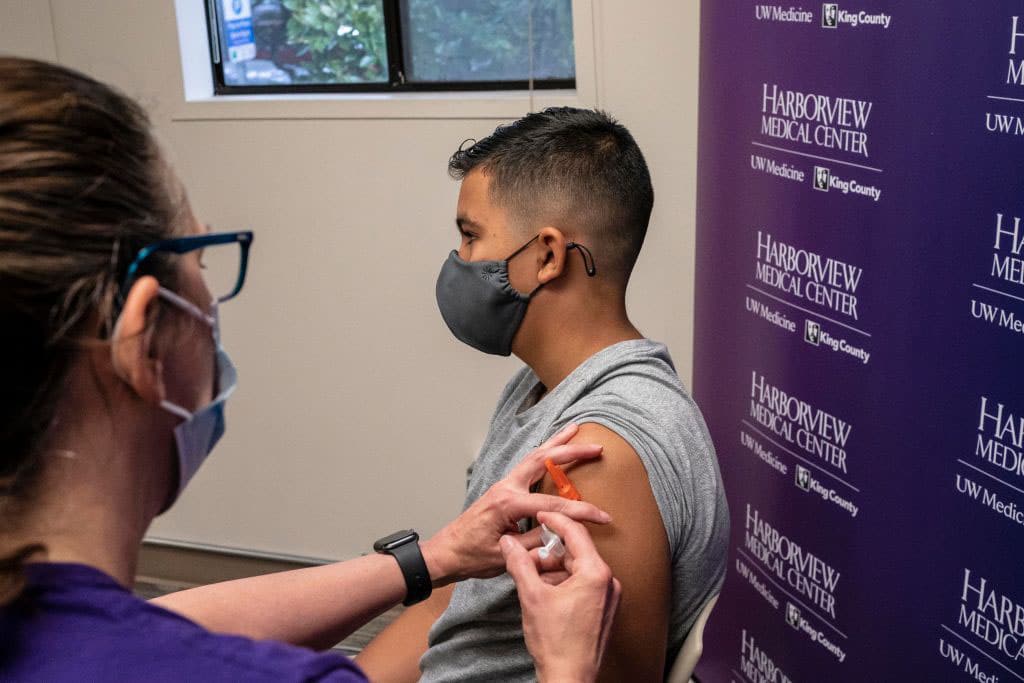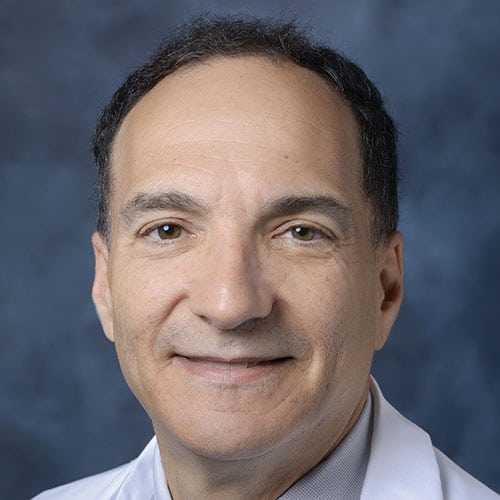 Nurse Maureen Stevens administers a first dose of the Pfizer COVID-19 vaccine to Caleb Matthew Laing, 12, at Harborview Medical Center on May 13, 2021 in Seattle, Washington. (Photo by David Ryder/Getty Images)
Nurse Maureen Stevens administers a first dose of the Pfizer COVID-19 vaccine to Caleb Matthew Laing, 12, at Harborview Medical Center on May 13, 2021 in Seattle, Washington. (Photo by David Ryder/Getty Images) When the British marched out of Yorktown following their improbable defeat in the Revolutionary War, their military band reportedly played “The World Turned Upside Down.” That might be the anthem of a medical profession caring for patients who prefer possible death to the negligible risk of a safe vaccine taken by over one hundred fifty million Americans. As I’ve stated before in these pages, doctors have been surprised to see the once respected FDA contributing to our new Wackiness Era.
The agency previously erred in slandering the life-saving Johnson and Johnson vaccine by imposing a since rescinded moratorium due to a one-in-a-million side effect. Its most recent baffling actions included the approval of the largely ineffective Alzheimer drug Aduhelm, an action opposed by a 10-0 vote (with one abstention) by the agency’s own advisory panel. Oh, and did I mention that the cost of this placebo strength treatment is $56,000 per year? But the Aduhelm farce does less harm than the FDA’s conspicuous foot dragging on COVID-19 vaccine approval.
In December, the FDA issued the first Emergence Use Authorization (EUA) for a COVID vaccine. EUAs allow use of a drug in an emergency when effective and adequate alternatives are not available. Over 150 million Americans have since been vaccinated. Yet the vaccines’ persistent “second class approval status” remains problematic. As a physician trying to convince patients to protect their lives with vaccination, it’s difficult to counter the common, “I’ll wait and see” when the FDA seems to be saying the same thing.
The FDA needs to hear the story I tell my patients. Although one can never be one hundred percent certain, the vaccines are very, very unlikely to pose an unexpected health risk. Most vaccine-related side effects occur early on, during the immune response that produces protective antibodies. After 150 million administrations, we’d likely know if there were a major problem that affected vaccine recipients early on. Within weeks after the final vaccine dose, all that remains are antibodies. Those antibodies would be expected to pose no more long-term risk than antibodies from polio, smallpox or other vaccines that nearly all Americans have taken.
I asked an octogenarian patient of mine why he refused COVID vaccination when he had taken polio vaccine without hesitation decades ago. “That was a vaccine campaign that was well handled,” he claimed. He also cited concern about the new technology being used in the COVID vaccination. Indeed, the polio vaccine campaign was well handled. But the vaccine technology was just as new. The world had never seen widespread vaccination using a killed virus. In fact, an error by a contracted vaccine producer mistakenly allowed live vaccine into some vaccine lots, leading to about 250 cases of vaccine related polio. Yet the public understood that a manufacturing error did not impugn the inherent safety of the vaccine. The public also appreciated the vaccine as a benefit of applied science, like electrification, television and air travel. Based on common-sense public cooperation, polio was entirely eradicated in the U.S. So, what changed? One change was that Americans of the 1950s didn’t have Fox News generating advertising revenue by exploiting base and irrational fears. Social media also plays a role as a massive “truth optional” opinion maker.
The FDA’s equivocation plays into the hands of ignorant anti-vaxxers while making it difficult for businesses to take action to protect workers and customers.
The FDA’s equivocation plays into the hands of ignorant anti-vaxxers while making it difficult for businesses to take action to protect workers and customers. Healthcare facilities and other employers have hesitated to require vaccination due to the uncertainty surrounding the legality of such policies for an unapproved vaccine. My own hospital would likely require all employees with patient contact to be vaccinated were the vaccine approved. The medical staff and administration believe that the public deserves to have confidence that healthcare facilities and their employees are doing everything to protect patient health. As the system mandates flu vaccine during flu season, the same policies should apply to COVID-19 vaccination. Such efforts to protect patients deserve FDA support now, not in weeks or months.
The aggressive spread of the Delta virus is a clarion call for the unvaccinated, as it is for the FDA. The philosopher George Santayana famously commented that those who don’t remember history are condemned to repeat it. The scholarly perspective advocated by Santayana is probably too much to expect in the new Wackiness Era of social media and Fox news. Regarding COVID-19, a contemporary Santayana might dumb down the quote to read that those who ignore last week’s news are destined to become the next week’s.
Daniel Stone is Regional Medical Director of Cedars-Sinai Valley Network and a practicing internist and geriatrician with Cedars Sinai Medical Group. The views expressed in this column do not necessarily reflect those of Cedars-Sinai.






















 More news and opinions than at a Shabbat dinner, right in your inbox.
More news and opinions than at a Shabbat dinner, right in your inbox.